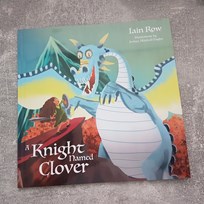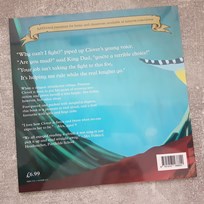How did A Knight Named Clover come to be?
I've been telling the story of 'A Knight Named Clover' for many years, ever since my eldest daughter was born. Back then the princess wasn't called Clover, and there were a few more characters, but the fundamental plot is exactly the same.
My wife and I both loved reading to our girls, but were frustrated by the way the female characters frequently needed rescuing. Sometimes the girls would be strong and capable characters, but surrounded by stupid men. I wanted to redress the balance.
All the same, I knew that as a parent as I was going to regularly make mistakes, so I wanted the character of the father to represent that. He says all the right things about empowerment, and even trains his daughter to be an excellent knight, but when danger appears he is unable to overcome his protective instincts. I have no problem relating to him - you could say that this book is a pre-emptive apology for all the times I will get things wrong on that front!
Why self-publish?
I didn't intend to self-publish this book; I thought I'd send it off to a few traditional publishers and see what happened. According to my research, the best way to approach a publisher was via an agent, so I applied to six literary agents specialising in children's books. I sent them all my manuscript - which I though at the time was the final one - and waited to hear back. Six weeks later I had six rejection letters. Still convinced that I had a story worth telling, I decided to explore self-publishing.
Since I already ran another business, the idea of publishing my own book was not too intimidating. I was already well aware that publishers do a lot more than just printing the books. They invest their own money, so they are excellent at quality control, which means having editors on their payroll. They pay for the illustrations and manage the illustrators, providing art direction as required. They do, of course, manage the print process, and then they handle distribution, getting the books physically into bookshops. It's a costly business with no guarantee of success.
As an unknown author, I knew that any publisher would expect me to do most of the promotional work myself. I also knew that they typically budget for 15% of their income to be paid to the creators of the work: the authors and illustrators. Given that the publisher might only receive 50% of the sale price of the book once distribution and bookshop margins had been taken away, that meant that only 7.5% of the cover price of my book would be coming my way, and I'd have to split that with my illustrator. Then my agent would take 15% or so.
The upshot was that a book retailing for £6.99 might actually only earn me 22p every time it was sold. If they gave me an advance of £9,000; I'd have to sell more than 40,000 books before I received another penny. No wonder most authors don't earn out their advance.
Also, it's no wonder agents are not keen on picture books; they are only going to make half the money - unless they represent the illustrator as well, increasing their workload - and books that rhyme can be a tricky sell because they don't easily translate into other languages.
If I managed my budget properly, however, I calculated that I could pay for the illustrations, editing, printing and promotion from my own pocket and break even after 1,000 books. For me, that seemed a risk worth taking.
For a deep-dive into the finances, take a look at my dedicated Self-Publishing Financials page.
So, how do you pronounce 'Scourge'?
If you were writing it phonetically (that is, the way it sounds, not the way it is correctly spelt) you'd write down 'Skurj'. When I started writing this book, I assumed it was a word most people would know. Turns out that was not entirely correct!



